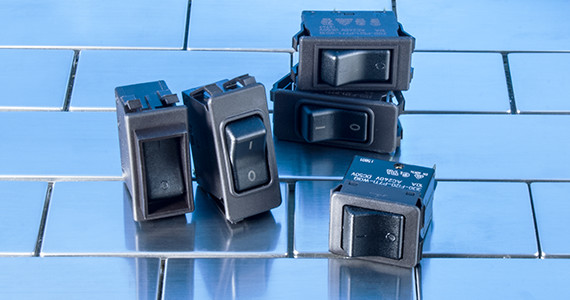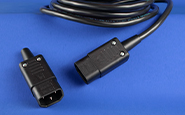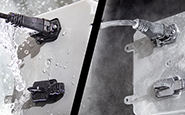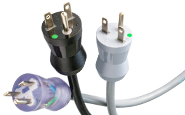Choosing Between a Circuit Breaker and a Fuse

When designing electronic or electrical equipment, a critical element is circuit protection. This protection usually is through a circuit breaker or a fuse. While the functions are similar, there are differences to consider when choosing between the two.
Circuit Breakers
What is a Circuit Breaker?
A circuit breaker (also called a CBE—Circuit Breaker for Equipment) is an automatic switch that prohibits the flow of electric current when it is rapidly overloaded or unusually stressed.
How Does a Circuit Breaker Work?
In principle, a circuit breaker is like a fuse—it can open the circuit pathway in the event of an overload or short circuit. Unlike the fuse, the circuit breaker is reusable. It is available in a manual or automatic reset. A manual reset requires the user to press a button or move a lever to reset the circuit pathway. An automatic reset will return to normal functioning once normal conditions resume.
When the current is larger than the circuit breaker is designed to handle, the switch contacts open, breaking the current. This occurrence is often referred to as being “tripped.” When the issue is resolved (whatever “tripped” the circuit is repaired), the circuit breaker can be reset. The contacts will remain closed unless another overcurrent fault condition occurs in the protected circuit, causing it to trip again.
Characteristics of a Circuit Breaker
Circuit breakers only protect against low-level faults and are not meant to clear faults with high-voltage levels. A circuit breaker is not a surge suppressor for catastrophic events, such as lightning strikes or high-voltage line shorts.
A circuit breaker is reusable and can be reset after it has tripped. While it may take longer for a circuit breaker to trip when exposed to moderate overloads, at high overloads, it tends to trip more quickly. When tripped, it provides a clear indication that it has tripped.
It can eliminate an incorrect fuse replacement because it is reusable. When a fuse is needed, there is the possibility that an incorrectly rated fuse may be used which could result in injury or equipment damage.
A circuit breaker’s design allows for repeated use. It can be used many times before needing to be replaced. Factors that may affect its life span include arc strength, setting time, and frequency of resetting.
Ambient temperatures do not affect some types of circuit breakers as much as a supplementary fuse may be affected.
A circuit breaker, when compared to a supplementary fuse, is larger in size, so it takes up more panel and internal space. If it does become disabled, replacing one may require a technician to replace it.
The ratings are in larger increments for a circuit breaker. Many are not available with the minute adjustment levels of certain fuses. For example, a fuse can be in milliamps, while a circuit breaker is in even or half increments.
Initially, a circuit breaker may be more costly than a fuse. The savings can come with the reduction in replacing components.
Fuses
What is a Fuse?
A fuse is replaceable circuit protection device that provides protection to both the equipment and the equipment operator in the event of a circuit overload.
How Does a Fuse Work?
Typically fuses are constructed using a thin metal strip or filament sheathed in a glass or ceramic enclosure. The metal strip is attached on each end to a separate terminal on the outside of the fuse. These external terminals mate with matching terminals attached to the protected circuit. Any current, or flow of electricity, that moves through the circuit flows through the metal inside the fuse.
The metal strip will melt when the current exceeds the amount that the fuse is designed to withstand, opening the circuit path, and disconnecting the equipment from the power source. When a traditional fuse disconnects or “blows” it must be removed and replaced with a new fuse.
Characteristics of a Fuse
A fuse tends to be more economical in terms of component costs than a circuit breaker and may be the more recognizable form of protection with equipment designers and users.
There are two standard sizes of fuses used throughout the world: 5 x 20mm (used worldwide) and ¼ x 1¼-inch (typically used only in North America).
A fuse can be removed easier to make changes to if needed during the design stage, especially when a product is being designed for multiple markets. For example, a North American product operating at 115VAC might be protected with a 6A fuse. The same product could be shipped to an international market where it might run on 230VAC. To accommodate the 230VAC power supply, the 6A fuse could be exchanged for a 3A fuse. This change can be made quickly and easily by using a fuse holder that is compatible with both North American and international fuses and fuse carriers. If the designer used a circuit breaker instead of a fuse, there could be extensive redesign requirements when shifting from a circuit breaker compatible with North American power requirements to one compatible with international power requirements.
Another suggested strategy, if the equipment will be marketed to both North America and other global markets, is to use a 5 x 20mm fuse. When marketing globally, this common fuse size can help to keep components costs and overhead down.
Additional Resources
For more information on circuit breakers and fuses, see Circuit Breakers and Fuses and Fuse Holders on Interpower’s website. See also the Interpower Featured Product pages on Circuit Breakers and Fuses and Fuse Holders.
Interpower offers free technical support. For further assistance, please see Interpower’s contact information below.






